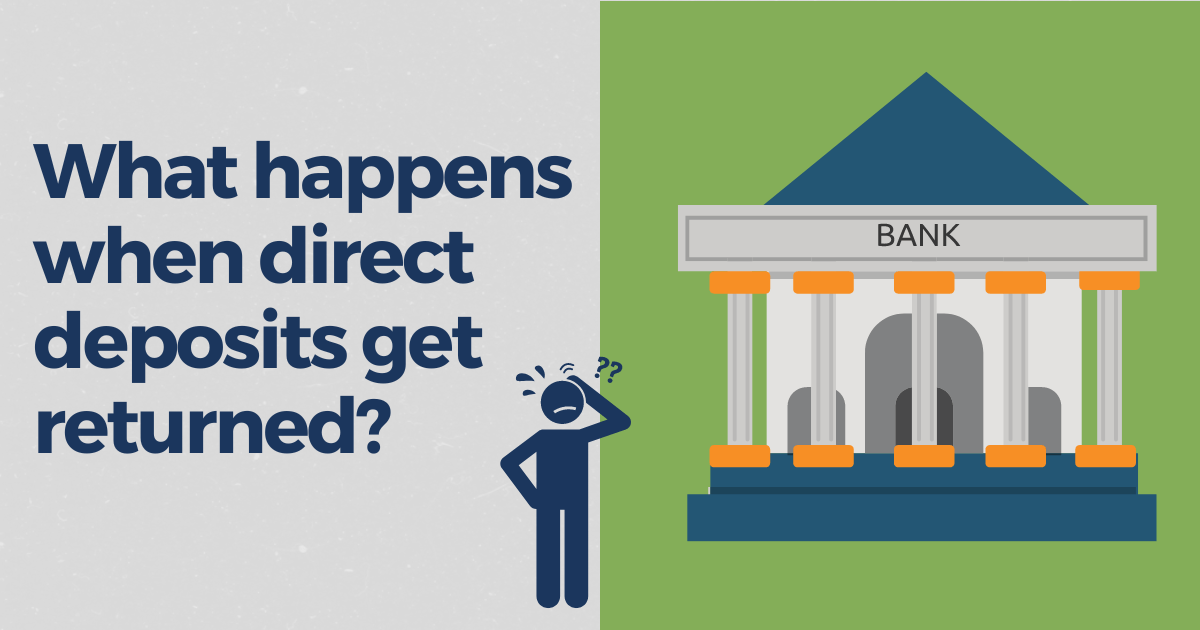
Before I was a Payroll Specialist, I was an “HR-Department-of-One” and believe me, nothing could dampen the excitement of payday faster than an employee marching up to me, frustrated because they didn’t get paid.
This is our most basic duty as an employer, right? They perform a skill, and then we pay for their time and effort.
Add to that the recent poll showing 78% of Americans are living paycheck-to-paycheck, and it’s safe to assume that your employee was counting on that money and needs this addressed immediately.
Besides reassuring the employee that this has your full attention, I find that it helps to understand what’s happening behind the scenes so you can set the most accurate expectations for your employee.
What is a Direct Deposit?
We hear it used all the time, but what is direct deposit? To put it simply, direct deposit is an electronic payment of funds from one bank account to another, in this case, your company’s bank account to an employee’s bank account.
If you want to get into the nitty-gritty of it, direct deposit is an “ACH payment,” which is the classification banks use for these types of electronic, automatic transfers of deposits between banks.
They are called ACH payments because (in the U.S.) they are managed by a financial network called the Automated Clearing House, which is so massive that it moved $81 trillion in 2023 alone!
This system is designed to streamline payroll processes, reduce the risk of lost checks, and provide a quick and reliable method for employees to receive their wages.
How Direct Deposits Work
Let's say you’ve hired Joe Employee into your company and input his routing and account number for direct deposit into payroll.
Here's how the money moves from your company to Joe’s account:
Step 1: You (or your payroll provider) send an electronic file to your company’s bank with account information and payment amounts for each employee.
Step 2: The bank then takes all direct deposits it has received from various companies, bundles them up, and sends them off to the ACH.
Step 3: The ACH sorts and sends the deposits to each employee’s bank.
Step 4: Joe’s bank receives the ACH order and posts the credit to his account, all within 1-2 business days.

This process makes payroll more efficient, and it also offers employees faster access to their funds compared to traditional paper checks.
What Causes a Direct Deposit Return
Even though the banks and ACH do their part, sometimes funds don’t reach the employee's account. There are a few things that may interrupt that money from going where it needs to:
What could have gone wrong?
- Missing or incorrect account information
- Missing or incorrect routing number
- An existing routine or account number for an account that doesn't belong to that employee
- A frozen or closed bank account
How can you prevent it?
Avoid these issues by requesting a voided check or a letter from the employee's bank to set up their direct deposit.
Also, clearly communicate a deadline for payroll changes so employees know when they need to inform you of any updates to their account information.
What Happens After the Direct Deposit is Returned?
If Joe’s bank is unable to deposit the funds, the process to resolve it is as follows:
1. Return to ACH
Funds will be returned to the ACH, typically within 2 business days of the pay date.
2. Return to the Company
It can take another 2-3 business days for the funds to return to your company's account.
3. Notification and Deactivation
Once you're notified, be sure to deactivate the invalid account so that no future deposits will be attempted.
4. Reissue Payment
Once funds are returned to your company's account, you can arrange payment directly with the employee by manual check or an alternate method.
The Importance of Efficient Payroll Systems
Ultimately, returned direct deposits can be a stressful situation for both the employee and you, the HR contact. It is important to put systems in place to prevent these mistakes from happening and provide you and your employees the peace of mind of knowing their paychecks will arrive on time.
Employees depend on timely and accurate payments, and any hiccups in this process can lead to dissatisfaction and decreased productivity.
Investing in a reliable payroll system and regular training for HR staff on payroll procedures can significantly reduce errors and improve the overall efficiency of the payroll process.
Considering Your Payroll Options: In-House vs. Outsourcing
If you're on the fence about whether to handle payroll in-house with software like QuickBooks or to outsource it, our team of nerds (just kidding, here we call them experts) has got you covered.
Deciding between in-house payroll software and outsourcing can be tricky. Each option has its pros and cons, and the best choice really depends on what your business needs.
If you want a detailed look at both options to help you decide,
take a look at our article, QuickBooks or Payroll Outsourcing: Which is Right for Your Business? It breaks down everything you need to know to choose the best path for your business.